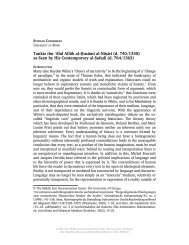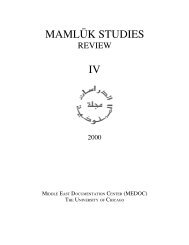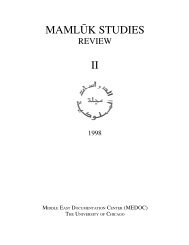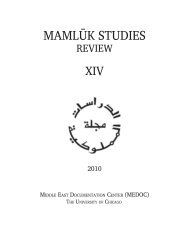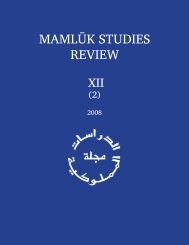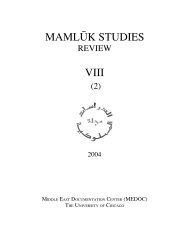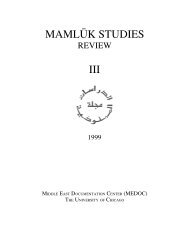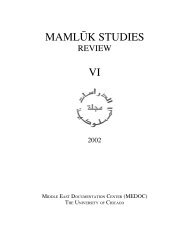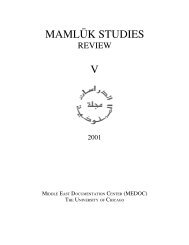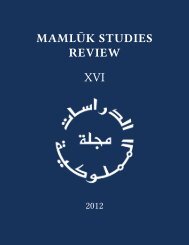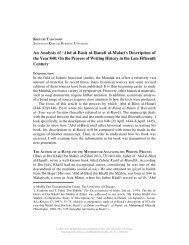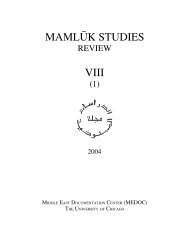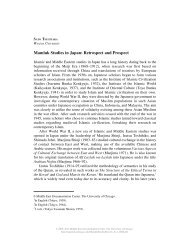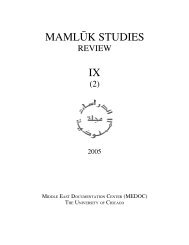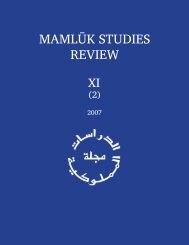Vol. VII, no. 1 (2003) - Mamluk Studies Review - University of Chicago
Vol. VII, no. 1 (2003) - Mamluk Studies Review - University of Chicago
Vol. VII, no. 1 (2003) - Mamluk Studies Review - University of Chicago
Create successful ePaper yourself
Turn your PDF publications into a flip-book with our unique Google optimized e-Paper software.
40 GEERT JAN VAN GELDER, POETRY FOR EASY LISTENING<br />
Ludh bi-al-ghara≠mi wa-ladhdhati al-ashwa≠q|<br />
wa-ikhtar fana≠’aka f| al-jama≠li al-ba≠q|<br />
Wa-ikhla‘ sulu≠waka fa-huwa thawbun mukhlaqun<br />
wa-ilbas jad|da maka≠rimi al-akhla≠q|<br />
Wa-tawaqqa min na≠ri al-sűdu≠di bi-shurbatin<br />
min ma≠’i dam‘ika fa-huwa ni‘ma al-wa≠q|<br />
Wa-idha≠ da‘a≠ka ilá al-s˝iba≠ nafasu al-s˝aba≠<br />
fa-ajib rasu≠la nas|mihi al-khaffa≠q|<br />
Wa-idha≠ sharibta al-s˝irfa min khamri al-hawá<br />
iyya≠ka taghfalu ‘an jama≠li al-sa≠q|<br />
Wa-ilqa al-ah˝ibbata in aradta wisa≠lahum<br />
mutaladhdhidhan bi-al-dhulli wa-al-imla≠q|<br />
A-wa-laysa min ah˝lá al-mat¸a≠mi‘i f| al-hawá<br />
‘izzu al-h˝ab|bi wa-dhillatu al-‘ushsha≠q| 27<br />
[Take refuge in love and the pleasure <strong>of</strong> passion<br />
and seek your extinction in beauty that lasts.<br />
Take <strong>of</strong>f the old cloak, <strong>no</strong>w worn out, <strong>of</strong> your solace;<br />
and get yourself dressed in a new set <strong>of</strong> virtues.<br />
Seek protection 'gainst fire <strong>of</strong> rejection by drinking<br />
the water <strong>of</strong> tears: they're the safest protection.<br />
When the zephyr invites you to amorous folly,<br />
obey then the messenger sent in its fluttering breeze.<br />
And when you have drunk the unmixed wine <strong>of</strong> passion,<br />
be careful to <strong>no</strong>tice the cupbearer's beauty.<br />
And meet those you love, if you wish to be one with them,<br />
while you relish in being submissive and poor.<br />
For isn't this one <strong>of</strong> the sweetest ambitions in love:<br />
the beloved exalted, and humbled the lovers?]<br />
The poem is based on an <strong>of</strong>ten-expressed paradox: a lover's true happiness exists<br />
in being miserable, and it ought to be his highest ambition to be lowly and<br />
submissive. This is expressed through various instances <strong>of</strong> paro<strong>no</strong>masia:<br />
ludh/ladhdha, mukhlaq/akhla≠q, tawaqqa/wa≠q|, s˝aba≠/s˝iba≠, mutaladhdhidh/dhull,<br />
and <strong>of</strong> antithesis: fana≠’/ba≠q|, ikhla‘/ilbas, mukhlaq/jad|d, na≠r/ma≠’, ‘izz/dhillah.<br />
Combined, these two figures suggest a punning antithesis <strong>of</strong> ladhdhah "pleasure"<br />
and dhillah/dhull "submission" that here, exceptionally, goes beyond the confines<br />
27 Khiza≠nah, 260/1:453.<br />
© <strong>2003</strong>, 2012 Middle East Documentation Center, The <strong>University</strong> <strong>of</strong> <strong>Chicago</strong>.<br />
http://mamluk.uchicago.edu/<strong>Mamluk</strong><strong>Studies</strong><strong>Review</strong>_<strong>VII</strong>-1_<strong>2003</strong>.pdf



